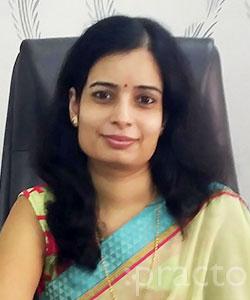
In every woman’s life, fertility plays a crucial role, influencing both her physical health and emotional well-being. Understanding the intricacies of fertility can empower women to make informed decisions about their reproductive health. Dr. Jagrati Laad MD, a distinguished Obstetrician and Gynecologist specializing in Infertility Treatment in Pune, offers valuable insights into managing and enhancing fertility at various stages of life.
Dr. Jagrati Laad MD is a highly skilled specialist with a Master’s Degree from SSG Hospital and Government Medical College Vadodara. Certified in Ultrasonography by FOGSI, her Fellowship in Infertility from Nadkarni Hospital and Test Tube Baby Centre, Vapi, Gujarat, underscores her expertise in assisting couples facing infertility challenges. Dr. Laad’s passion for infertility treatment, High-Risk Pregnancies, and comprehensive women’s health care exemplifies her commitment to patient-centered excellence. This guide aims to educate women about their fertility across different life stages, from understanding peak fertility in their 20s to navigating fertility challenges in their 40s. Dr. Laad’s expert advice will provide actionable insights into preserving and optimizing reproductive health.
Section 1: Fertility in Your 20s
- Overview: Women in their 20s typically experience optimal fertility characterized by regular menstrual cycles and a high ovarian reserve. This period is often referred to as the peak fertility phase.
- Fertility Peaks: During this time, women have the highest chances of conception due to robust egg quality and quantity. The menstrual cycles are usually regular, indicating healthy reproductive function.
- Common Concerns: While fertility is generally robust in the 20s, lifestyle factors such as stress, poor diet, smoking, and excessive alcohol consumption can affect reproductive health. Irregular menstrual cycles may also indicate underlying hormonal imbalances or conditions that can impact fertility later.
- Advice from Dr. Laad: Dr. Jagrati Laad recommends maintaining a healthy lifestyle with balanced nutrition, regular exercise, and stress management techniques. It’s crucial for women in their 20s to consider their family planning goals and prioritize reproductive health check-ups to detect any potential issues early.
Section 2: Fertility in Your 30s
- Overview: Fertility starts to decline gradually as women enter their 30s, primarily due to age-related changes in egg quality and quantity.
- Decline in Fertility: By the early 30s, ovarian reserve begins to diminish, reducing the chances of conception compared to the 20s. The decline becomes more pronounced towards the late 30s.
- Balancing Career and Family: Many women face the challenge of balancing career aspirations with family planning during their 30s. Delaying pregnancy to advance in career goals may impact fertility outcomes.
- Expert Tips: Dr. Laad emphasizes the importance of regular fertility assessments, especially for women approaching their mid-30s. Lifestyle adjustments such as maintaining a healthy weight, quitting smoking, and reducing alcohol intake can positively impact fertility outcomes. Monitoring ovulation cycles and considering fertility preservation options may also be recommended.
Section 3: Fertility in Your 40s
- Overview: Fertility significantly declines in the 40s, marked by reduced ovarian function and an increased risk of pregnancy complications.
- Increased Risks and Challenges: Women in their 40s have a higher risk of miscarriage, chromosomal abnormalities in embryos, and other health complications during pregnancy. The chances of natural conception decrease substantially.
- Importance of Medical Support: Dr. Laad stresses the importance of regular consultations with a fertility specialist for women in their 40s. Advanced fertility treatments such as in vitro fertilization (IVF), egg donation, and embryo freezing may be discussed to optimize the chances of successful pregnancy.
- Dr. Laad’s Recommendations: Understanding the limitations of age-related fertility decline is crucial. Dr. Laad provides insights into available options like egg freezing for women wishing to preserve their fertility options for later stages.
Section 4: Factors Affecting Fertility at Any Age
- Health and Lifestyle: Diet, exercise, and stress management play pivotal roles in reproductive health. Maintaining a balanced diet rich in nutrients, engaging in regular physical activity, and adopting stress-relief techniques can support optimal fertility.
- Medical Conditions: Conditions such as polycystic ovary syndrome (PCOS) and endometriosis can affect fertility. Dr. Laad explains how these conditions impact reproductive health and discusses treatment options to manage them effectively.
- Environmental Factors: Exposure to environmental toxins, smoking, and excessive alcohol consumption can adversely affect fertility. Dr. Laad advises minimizing exposure to such factors to improve reproductive outcomes.
- Expert Advice: Dr. Laad provides personalized guidance on managing these factors through lifestyle adjustments and, when necessary, medical interventions to enhance fertility potential.
Reclaim Your Health
Struggling with PCOS/PCOD? Dr. Laad offers personalized treatment plans to restore hormonal balance and improve your quality of life. Say goodbye to discomfort and hello to a healthier you!
Section 5: When to Seek Help
- Understanding Infertility: Infertility is defined as the inability to conceive after a year of regular unprotected intercourse. Dr. Laad explains the various causes of infertility and when couples should seek medical advice for evaluation.
- Diagnostic Tests: Common diagnostic tests include hormonal assessments (e.g., follicle-stimulating hormone, anti-Müllerian hormone levels) and ultrasound to assess ovarian reserve and detect structural abnormalities.
- Treatment Options: Dr. Laad outlines fertility treatment options ranging from medications to assisted reproductive technologies (ART) like intrauterine insemination (IUI) and IVF. Surgical interventions may also be recommended for certain conditions affecting fertility.
- Dr. Laad’s Approach: Emphasizing a patient-centric approach, Dr. Laad shares success stories of couples who have overcome infertility challenges under her care. She highlights the importance of personalized treatment plans tailored to each couple’s unique needs.
Boost Your Fertility
Boost your fertility with our advanced surgeries. Expert care and cutting-edge technology to help you start your family.
Section 6: Maintaining Reproductive Health
- Regular Check-Ups: Dr. Laad underscores the significance of regular gynecological visits for preventive care and early detection of reproductive health issues. Routine check-ups enable timely interventions and promote overall reproductive well-being.
- Preventive Measures: Tips on early detection of fertility issues through proactive monitoring and lifestyle modifications. Dr. Laad encourages women to prioritize their reproductive health by adopting healthy practices and seeking timely medical advice.
- Healthy Practices: Promoting long-term reproductive health involves adopting healthy habits such as maintaining a healthy weight, practicing safe sex, and staying informed about reproductive health topics relevant to their age and stage of life.
Understanding fertility is pivotal for every woman’s well-being. Dr. Jagrati Laad’s expertise and compassionate care empower women to navigate their fertility journey confidently. By prioritizing reproductive health and seeking timely medical advice, women can enhance their chances of achieving their family planning goals.
Final Thoughts from Dr. Laad
Dr. Jagrati Laad urges women to prioritize their reproductive health and emphasizes the importance of proactive fertility management. For personalized guidance and comprehensive fertility care, consult with Dr. Jagrati Laad at her Pune clinic.
Take charge of your reproductive health today. Schedule a consultation with Dr. Jagrati Laad to explore personalized fertility treatment options and embark on your journey toward parenthood with confidence.











